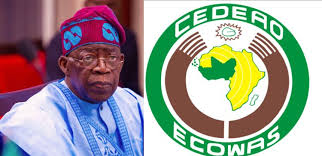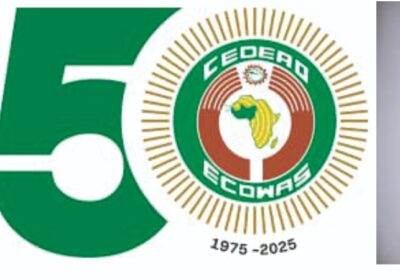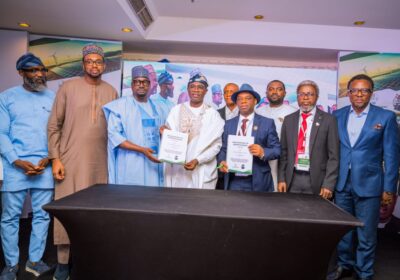Nigeria Leads as the Top Beneficiary of the ECOWAS Commission’s Establishment.
By Raymond Enoch”
As the Economic Community of West African States (ECOWAS) commemorates it’s 50th anniversary, (1975 -2025) Nigeria leads as the biggest beneficiary of the regional body’s initiatives, playing a pivotal role in its growth and gaining from the significant economic, political, and diplomacy of the ECOWAS.

With its strong economic base, Nigeria has leveraged its position to attract key ECOWAS institutions and drive regional policies that have boosted trade, security, and integration efforts.
As the largest economy and most populous country in the region, Nigeria has consistently provided leadership and financial support to ECOWAS. The country has hosted and facilitated the activities of multiple ECOWAS institutions, strengthening its influence within the West African bloc. Analysts argue that Nigeria’s strategic position in ECOWAS has enhanced its regional dominance, fostering economic partnerships and trade advantages across member states.
Nigeria hosts a significant number of ECOWAS institutions, reinforcing its status as a regional powerhouse. These institutions include:
ECOWAS Commission Headquarters located in Abuja, the commission serves as the administrative and executive arm of ECOWAS, coordinating policies and programs for regional integration.
ECOWAS Court of Justice – Also based in Abuja, this judicial organ ensures the interpretation and enforcement of ECOWAS treaties, protocols, and legal instruments.
ECOWAS Parliament – This legislative body, headquartered in Abuja, provides a platform for representatives from member states to debate and shape regional policies.
ECOWAS Bank for Investment and Development (EBID) Liaison Office. Nigeria hosts an important liaison office that facilitates investment and development projects.
Nigeria’s leadership in ECOWAS has yielded substantial gains across various sectors:
The Economic Community of West African States (ECOWAS) Trade Liberalization Scheme (ETLS) has significantly bolstered Nigeria’s trade within the West African region. As of the third quarter of 2024, Nigeria’s exports to ECOWAS countries reached approximately ₦1.54 trillion (about $1.96 billion). This robust trade underscores Nigeria’s pivotal role in regional commerce.
In terms of product representation under the ETLS, Nigeria accounts for a substantial share. As of 2020, the country had over 2,400 companies producing more than 6,900 products approved under the scheme, representing between 60% to 70% of all products within the ETLS framework.
The primary commodities driving Nigeria’s exports to ECOWAS include petroleum oils and oils obtained from bituminous minerals, which constituted 83.45% of the total exports, valued at ₦1.29 trillion.
Other notable exports are electrical energy (₦59.69 billion), liquefied petroleum gases and other gaseous hydrocarbons (₦35.84 billion), and superior quality cocoa beans (₦34.88 billion).
Key trading partners within ECOWAS for Nigeria are Ivory Coast and Togo. In Q3 2024, Ivory Coast imported goods worth ₦662.71 billion, while Togo’s imports stood at ₦574.93 billion. Together, these two countries accounted for 97.6% of Nigeria’s total exports to ECOWAS during this period.
These statistics highlight the significant impact of the ETLS in facilitating tariff-free access for Nigerian businesses to regional markets, thereby enhancing exports and fostering industrial growth.
Nigeria’s role in ECOWAS peacekeeping operations, especially through ECOMOG, has strengthened its diplomatic clout, making it a key mediator in regional conflicts.
The ECOWAS Protocol on Free Movement has allowed Nigerian citizens and businesses to expand across West Africa, while regional security collaborations have helped counter terrorism and transnational crimes.
ECOWAS-funded projects including disaster control, roads and energy infrastructure, have improved connectivity and facilitated Nigeria’s regional economic activities.
Despite its numerous advantages, Nigeria faces challenges in fully maximizing ECOWAS benefits. Issues such as border closures, smuggling, and regulatory bottlenecks sometimes hinder the seamless operation of regional trade agreements. Additionally, the country bears a disproportionate financial burden in funding ECOWAS programs, sparking debates over equitable contributions among member states.
Experts suggest that Nigeria should continue to strengthen regional partnerships, push for fairer economic policies within ECOWAS, and ensure that its investments in the bloc yield even greater economic and security returns.
As ECOWAS marks its 50th anniversary in the coming years, Nigeria stands tall as the biggest beneficiary of the regional body’s establishment. With its strategic location, economic prowess, and diplomatic weight, Nigeria is set to maintain its leadership role in West Africa, leveraging ECOWAS as a vital platform for regional integration, peace, and prosperity.








